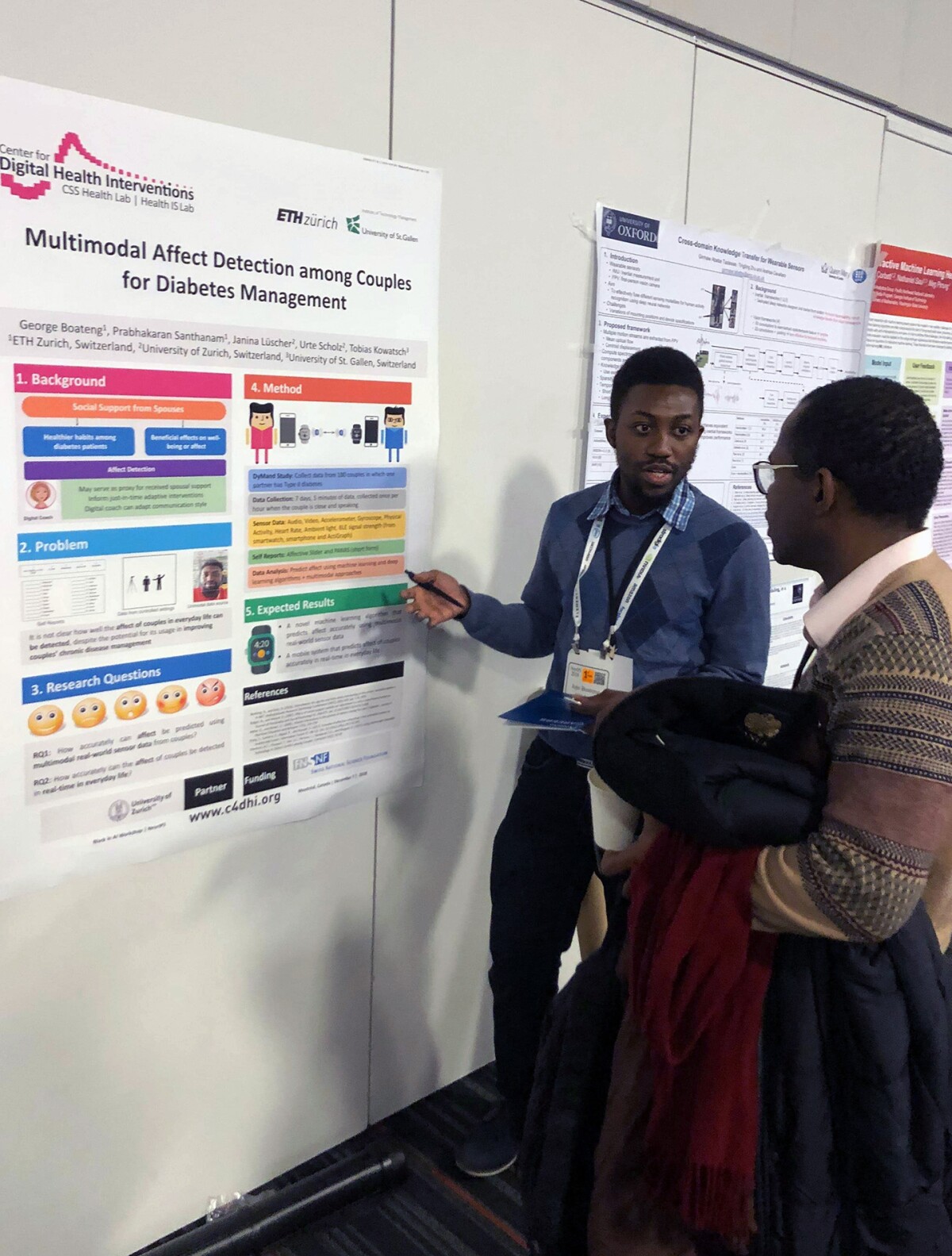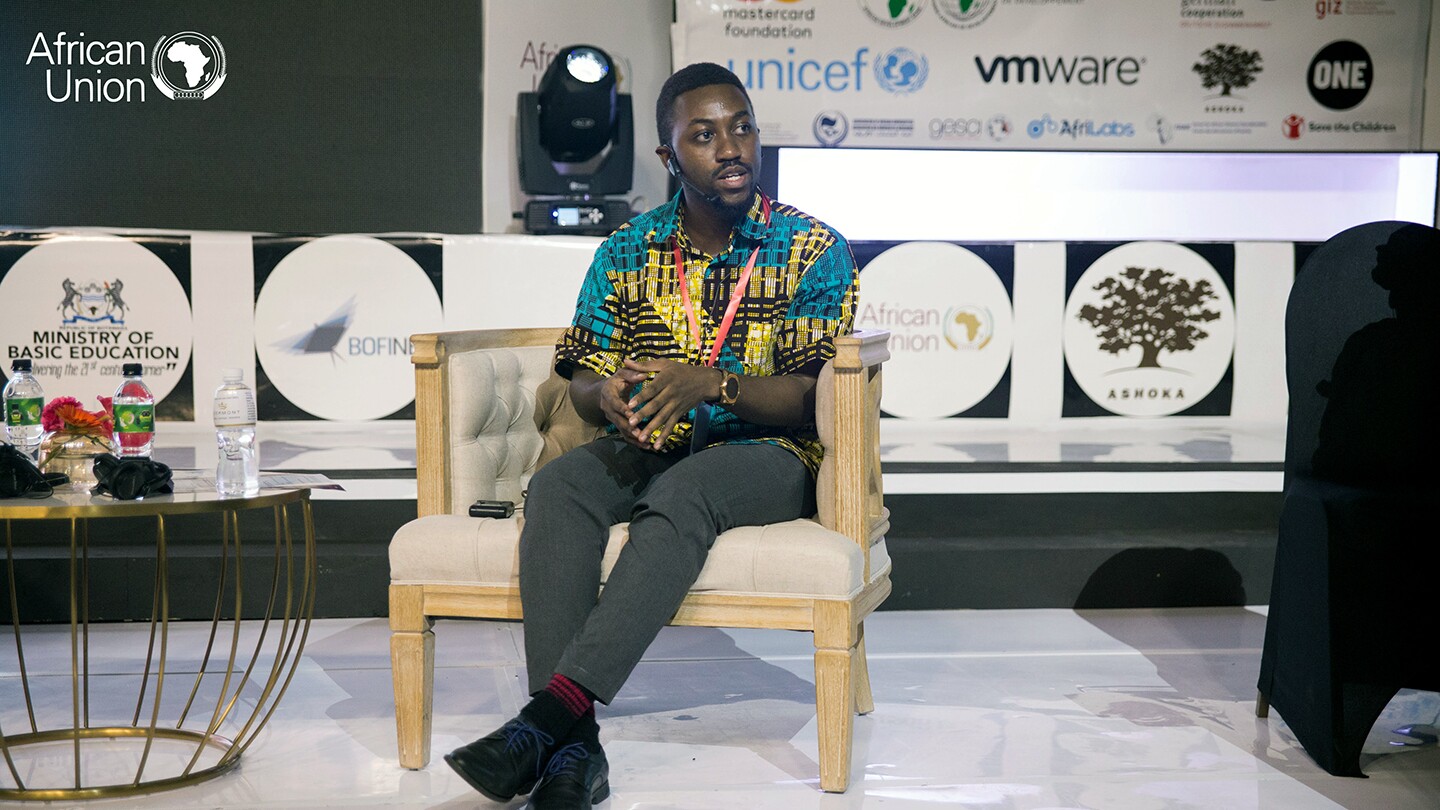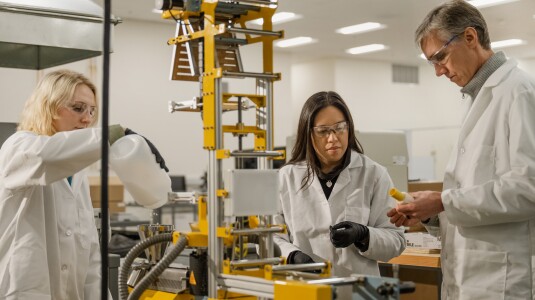Throughout his short but impressive journey as an engineer and social entrepreneur, George Boateng has seen solutions in scenarios where many people see problems.
While attending boarding school in his home country of Ghana, his fellow students’ clothes were continuously stolen while hanging up to dry. In response, he developed a portable electric dryer.
“I've always really been interested in science, technology, and engineering, and in building things,” said Boateng, 29. “When I was a young boy, my family would travel to visit my grandmother. I was fascinated by her encyclopedias, which she let me take with me so I could do science experiments at home.”
At Dartmouth College, where Boateng earned a bachelor’s degree in computer science, a master’s in computer engineering, and was an E.E. Just STEM Scholar and E.E. Just Graduate Fellow, he teamed up with friends to create the Nsesa Foundation, a nonprofit committed to democratizing STEM education across sub-Saharan Africa. Nsesa teaches young people engineering and computer programming skills to help close STEM education and employment gaps in a place where, according to the World Economic Forum, less than 1% of children finish school with basic coding skills.
“My cofounders and I started Nsesa to take Dartmouth’s popular introductory engineering course back home to Ghana,” Boateng explained. “I was amazed by how students, most of whom had not taken any advanced engineering courses, could go through a design and innovation process and actually build solutions to real-life problems and start companies.”
In 2013, he created a modified version of the course called Project iSWEST, a three-week innovation bootcamp in which high school and university students in Ghana could learn coding and innovation skills. When the program’s donated laptop computers had all broken down four years later, Boateng and his colleagues redesigned the eight-week, Java-based training program for devices all of the participants had: smartphones.
“SuaCode was truly an accidental project born out of our need to innovate around a lack of laptops,” said Boateng. That accidental project led MIT Technology Review to recently name Boateng one of its “35 Innovators Under 35.”
SuaCode teaches young students in Africa to code using Android devices and a bilingual (English and French) AI-powered teaching assistant, Kwame, named after Ghana’s first president, Kwame Nkrumah. After four successful pilots between 2018 and 2020, Boateng and his co-founder launched a startup, SuaCode.ai, to turn the program into a mobile app for greater scale and impact.
To date, SuaCode has introduced more than 2,000 learners from 42 African countries to the fundamentals of software. Boateng and his team are currently developing additional courses and partnering with universities across Africa to host and deliver programming through the SuaCode platform.
Boateng’s thirst for problem-solving also attracted him to an Alexa AI internship opportunity he saw online in 2020. “The Amazon Halo Band had just been released,” Boateng said. Amazon Halo is a health and wellness membership that integrates with a Halo device to help users manage their overall health. His research focused on Halo Tone, which analyzes qualities of voice, such as energy and positivity, to help members become more aware of how they may sound to others.
“The opportunity to work with the team of applied scientists that developed this first-of-its-kind technology was exciting to me,” he said.
For four months in 2021, Boateng worked with the Cambridge, Mass.-based Alexa AI team on one of the most challenging tasks in computational linguistics — sarcasm detection — with a focus on conversational speech. “Sarcasm can be ambiguous both to humans and to machines,” said Boateng, who completed the internship remotely from Zurich, where he is a doctoral candidate at ETH Zurich. “For example, if someone says ‘I love being ignored’, an emotion recognition system might think the statement is positive because of the use of ‘love’. But once you recognize sarcasm, you can infer this is actually a negative statement.”
The team took an experimental approach to sarcasm detection with the goal of improving Amazon Halo Tone features, conducting text and speech analyses on hundreds of episodes of two popular TV sitcoms — “Friends” and “The Big Bang Theory”.
“Before diving into this machine learning problem, our first step was to correctly define sarcasm,” Boateng said. “Our approach was grounded in linguistics theory and an empirical understanding of sarcastic utterances to comprehensively address sarcasm detection in conversational speech.”
Boateng and his colleagues developed a taxonomy of incongruity and expression in sarcastic utterances and performed systematic error analysis towards the goal of sarcasm detection. A paper is currently in the works. “We didn’t completely solve sarcasm detection,” Boateng wrote on LinkedIn. “But we have taken a giant step towards that goal.”

During the internship, Boateng sat in on weekly team meetings and welcomed feedback on his writing and problem-solving approaches from senior scientists. “It was really a big learning experience to understand Amazon’s ‘bias for action’ and ‘customer obsession’ principles,” he said. “I learned that you can’t spend too much time thinking about ways to approach a problem, you have to experiment and deliver results.”
“Alexa attracts top talent in machine learning and speech, due to opportunity to work on cutting-edge applied research,” said Viktor Rozgic, an Alexa principal applied scientist who was Boateng’s manager. “George’s background in developing emotion detection solutions for mobile and data collection design, as well as his ability to handle ambiguity, were very valuable on the project. We were impressed by his versatility, in particular his previous experience working on emotion recognition, mobile applications, and designing data collections.”
Boateng recommends an Amazon science internship for students motivated to tackle “real-world” problems without shying away from uncertainty.
“That’s what really drew me to Amazon,” he said. “A lot of times if you come from a technical background, your focus tends to be theoretical, publishing papers and presenting at conferences. But at Amazon, even though the work is technically rigorous, it’s always linked to real-world applications customers use.
“The key,” Boateng added, “is to not be scared to embrace big, ambiguous challenges.”
In addition to his PhD program at ETH Zurich, where he’s working on multi-modal emotion detection using sensor data from smartphones and smartwatches, Boateng is currently a visiting researcher at the University of Cambridge, where he’s exploring collaborations on AI-powered mobile health research. He remains focused on building SuaCode.ai while exploring mobile and wearable technologies in pervasive health.
“I’m passionate about using technology to help people live healthier lives,” said Boateng, who plans to pursue a postdoctoral research fellowship and hopes to become a professor. “I’m grateful for the opportunity to intern at Amazon. All of the lessons I learned will serve me well in the next chapter of my career and life.”







